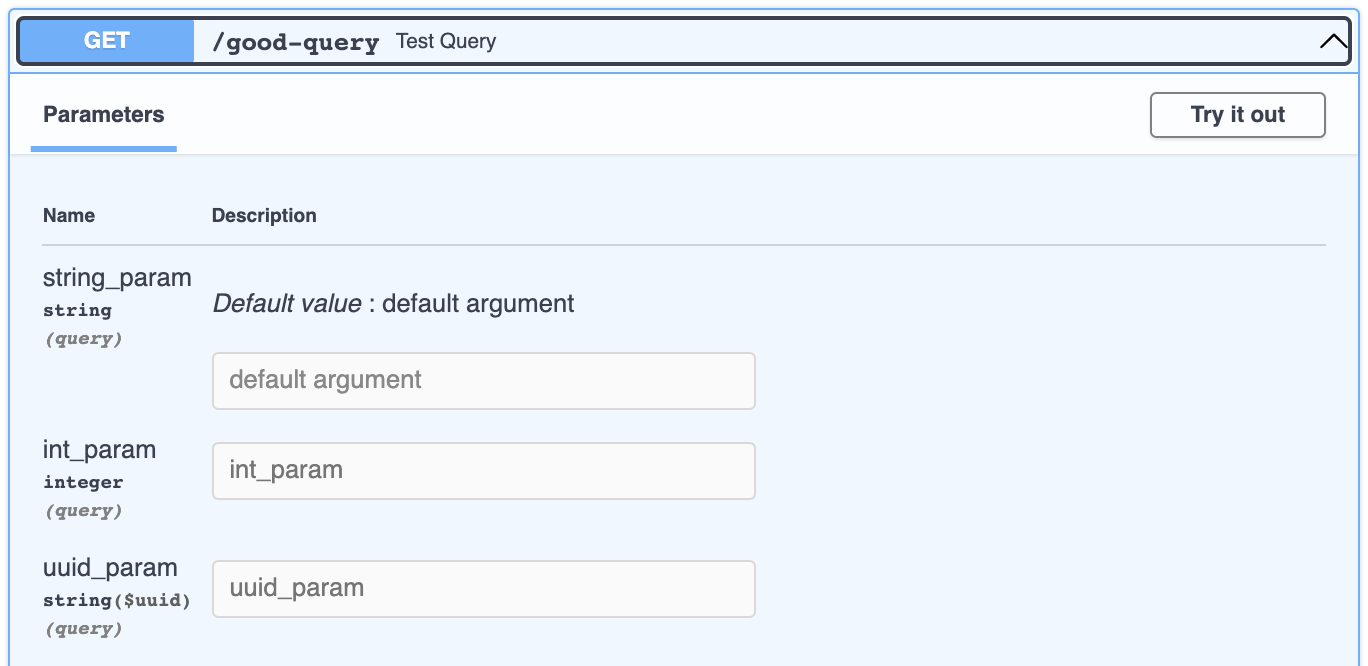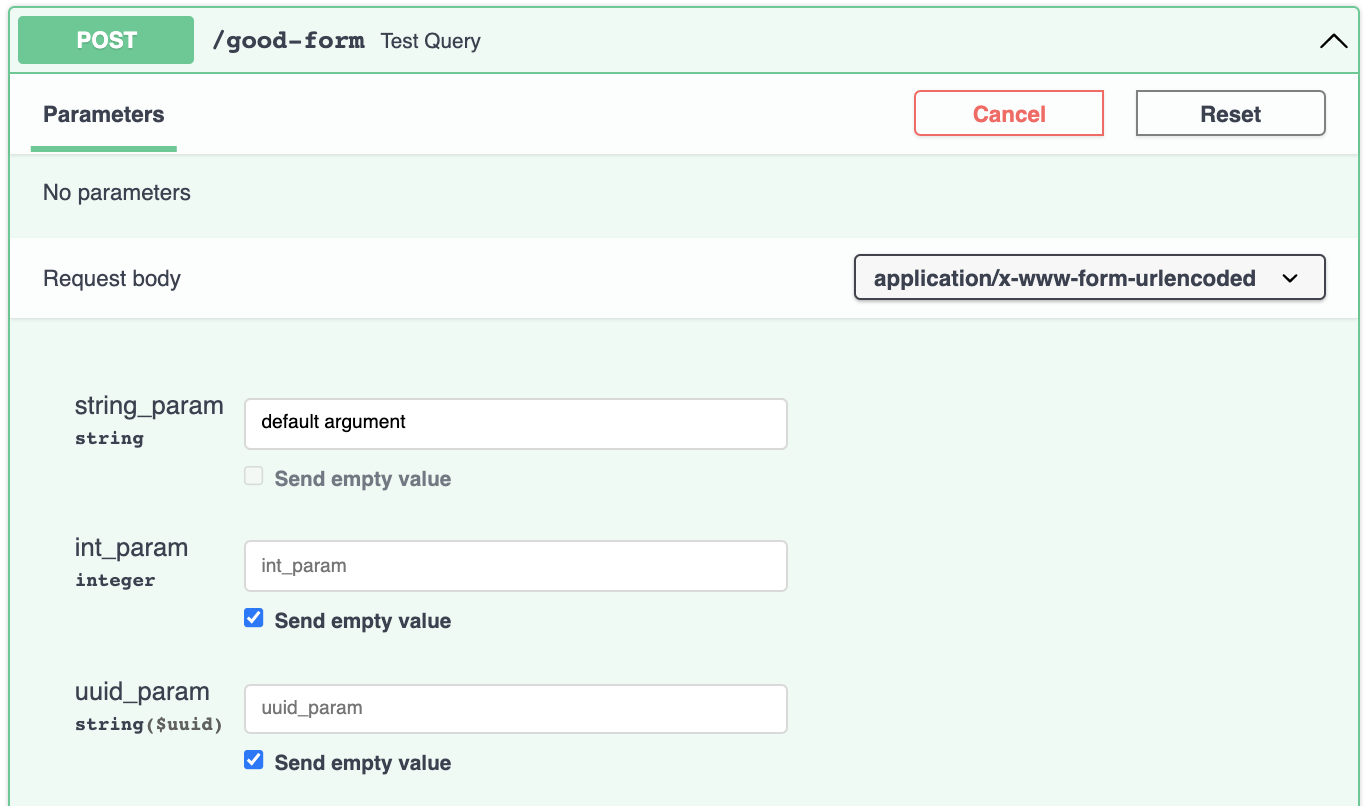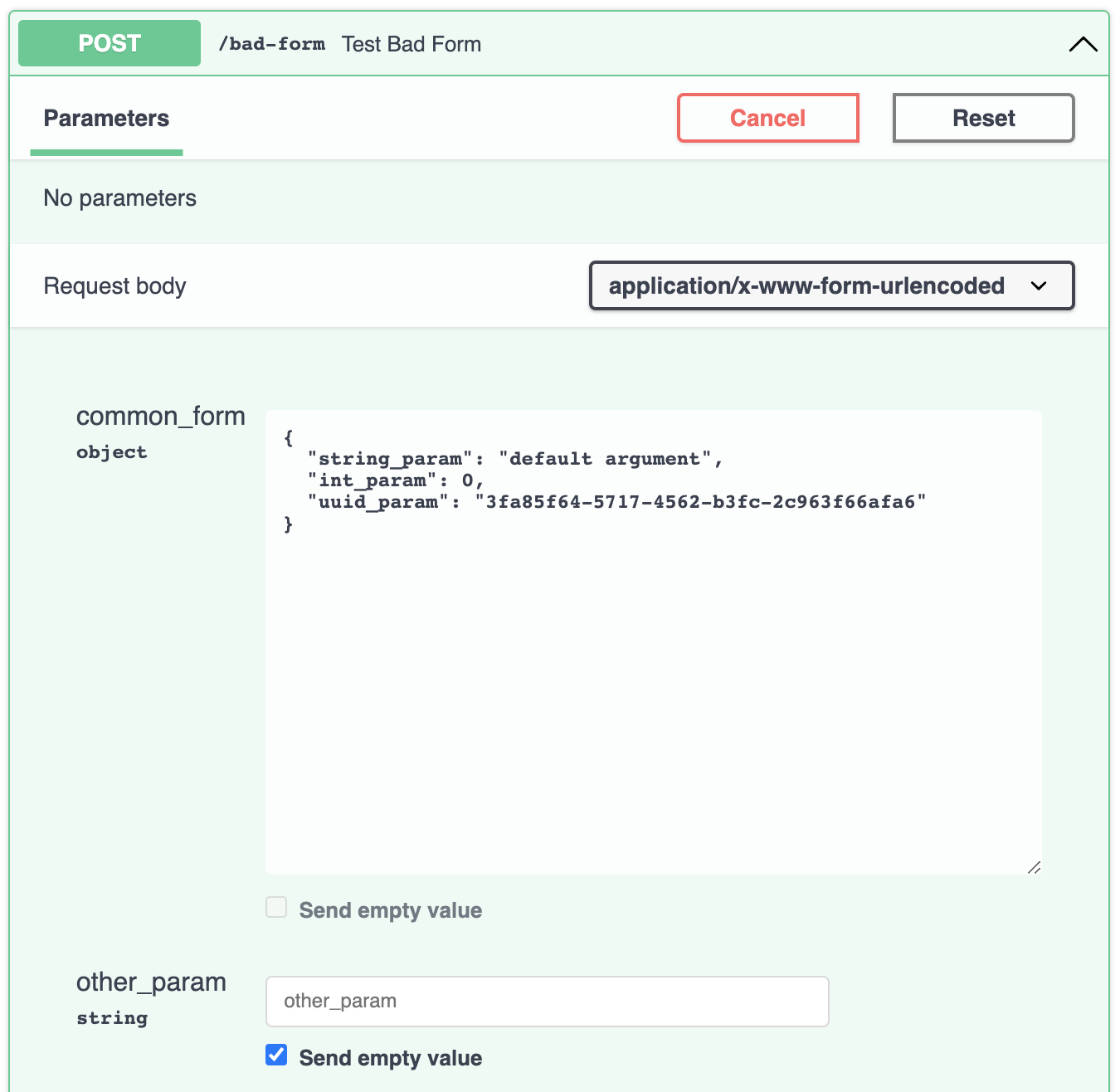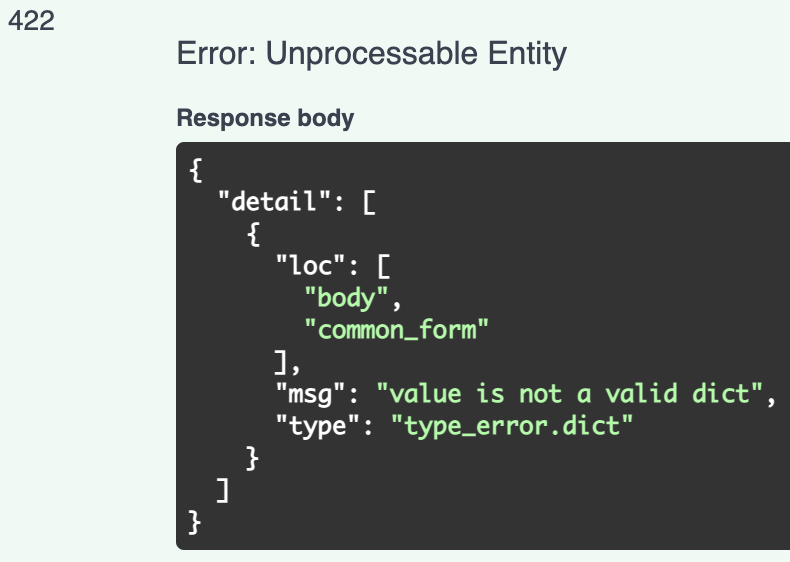Last active
July 5, 2021 19:29
-
-
Save fletcheaston/98e2fa088e101d6da30b414c3ba9b9bc to your computer and use it in GitHub Desktop.
Pydantic models from FastAPI query parameters and forms.
This file contains bidirectional Unicode text that may be interpreted or compiled differently than what appears below. To review, open the file in an editor that reveals hidden Unicode characters.
Learn more about bidirectional Unicode characters
| # Schema input manipulation. Very hacky, but it generates nice docs. | |
| # Copied from https://github.com/tiangolo/fastapi/issues/318#issuecomment-691121286 | |
| # These don't work for nested Pydantic models. | |
| import inspect | |
| from types import FunctionType | |
| from typing import Dict, Type | |
| from fastapi import ( # noqa | |
| BackgroundTasks, | |
| Form, | |
| HTTPException, | |
| Query, | |
| Request, | |
| Response, | |
| ) | |
| from pydantic import BaseModel, ValidationError # noqa | |
| def as_query(name: str, model_cls: Type[BaseModel]) -> FunctionType: | |
| """ | |
| Takes a pydantic model class as input and creates a dependency with corresponding | |
| Query parameter definitions that can be used for GET requests. | |
| This will only work, if the fields defined in the input model can be turned into | |
| suitable query parameters. Otherwise fastapi will complain down the road. | |
| Arguments: | |
| name: Name for the dependency function. | |
| model_cls: A ``BaseModel`` inheriting model class as input. | |
| """ | |
| names = [] | |
| annotations: Dict[str, type] = {} | |
| defaults = [] | |
| for field_model in model_cls.__fields__.values(): | |
| field_info = field_model.field_info | |
| field_name = field_model.name | |
| names.append(field_name) | |
| annotations[field_name] = field_model.outer_type_ | |
| defaults.append(Query(field_model.default, description=field_info.description)) | |
| code = inspect.cleandoc( | |
| """ | |
| def %s(%s): | |
| try: | |
| return %s(%s) | |
| except ValidationError as e: | |
| errors = e.errors() | |
| for error in errors: | |
| error['loc'] = ['query'] + list(error['loc']) | |
| raise HTTPException(422, detail=errors) | |
| """ | |
| % ( | |
| name, | |
| ", ".join(names), | |
| model_cls.__name__, | |
| ", ".join(["%s=%s" % (name, name) for name in names]), | |
| ) | |
| ) | |
| compiled = compile(code, "string", "exec") | |
| env = {model_cls.__name__: model_cls} | |
| env.update(**globals()) | |
| func = FunctionType(compiled.co_consts[0], env, name) | |
| func.__annotations__ = annotations | |
| func.__defaults__ = (*defaults,) | |
| return func | |
| def as_form(name: str, model_cls: Type[BaseModel]) -> FunctionType: | |
| """ | |
| Takes a pydantic model class as input and creates a dependency with corresponding | |
| Form parameter definitions that can be used for POST requests. | |
| This will only work, if the fields defined in the input model can be turned into | |
| suitable form parameters. Otherwise fastapi will complain down the road. | |
| Arguments: | |
| name: Name for the dependency function. | |
| model_cls: A ``BaseModel`` inheriting model class as input. | |
| """ | |
| names = [] | |
| annotations: Dict[str, type] = {} | |
| defaults = [] | |
| for field_model in model_cls.__fields__.values(): | |
| field_info = field_model.field_info | |
| field_name = field_model.name | |
| names.append(field_name) | |
| annotations[field_name] = field_model.outer_type_ | |
| defaults.append(Form(field_model.default, description=field_info.description)) | |
| code = inspect.cleandoc( | |
| """ | |
| def %s(%s): | |
| try: | |
| return %s(%s) | |
| except ValidationError as e: | |
| errors = e.errors() | |
| for error in errors: | |
| error['loc'] = ['form'] + list(error['loc']) | |
| raise HTTPException(422, detail=errors) | |
| """ | |
| % ( | |
| name, | |
| ", ".join(names), | |
| model_cls.__name__, | |
| ", ".join(["%s=%s" % (name, name) for name in names]), | |
| ) | |
| ) | |
| compiled = compile(code, "string", "exec") | |
| env = {model_cls.__name__: model_cls} | |
| env.update(**globals()) | |
| func = FunctionType(compiled.co_consts[0], env, name) | |
| func.__annotations__ = annotations | |
| func.__defaults__ = (*defaults,) | |
| return func | |
| ################################################################################ | |
| # Example for your FastAPI app. | |
| import uuid | |
| from typing import Optional | |
| from fastapi import Depends, FastAPI | |
| app = FastAPI() | |
| # This model works great. | |
| class QueryModel(BaseModel): | |
| string_param: str = "default argument" | |
| int_param: int | |
| uuid_param: Optional[uuid.UUID] | |
| @app.get("/good-query", response_model=QueryModel) | |
| def test_good_query(good_query: QueryModel = Depends(as_query("good_query", QueryModel))): | |
| return good_query | |
| # This model does not work. | |
| class BadQueryModel(BaseModel): | |
| common_query: QueryModel | |
| other_param: str | |
| # Uncommenting this will give the following error on startup... | |
| # `AssertionError: Param: common_query can only be a request body, using Body(...)` | |
| # @app.get("/bad-query", response_model=BadQueryModel) | |
| # def test_bad_query(bad_query: BadQueryModel = Depends(as_query("bad_query", BadQueryModel))): | |
| # return bad_query | |
| # This model works great. | |
| class FormModel(BaseModel): | |
| string_param: str = "default argument" | |
| int_param: int | |
| uuid_param: Optional[uuid.UUID] | |
| @app.post("/good-form", response_model=FormModel) | |
| def test_good_form(good_form: FormModel = Depends(as_form("good_form", FormModel))): | |
| return good_form | |
| # This model does not work. | |
| class BadFormModel(BaseModel): | |
| common_form: FormModel | |
| other_param: str | |
| # This will NOT give an error on startup, but it will error if you try to use the endpoint. | |
| @app.post("/bad-form", response_model=BadFormModel) | |
| def test_bad_form(bad_form: BadFormModel = Depends(as_form("bad_form", BadFormModel))): | |
| return bad_form | |
| if __name__ == "__main__": | |
| import uvicorn | |
| uvicorn.run("main:app", host="0.0.0.0", port=8000, log_level="info") |
Sign up for free
to join this conversation on GitHub.
Already have an account?
Sign in to comment
Edited to include examples for both query and form endpoints, and some small bugs/typos.
The docs render very nicely for the good examples.
The good query endpoint works as expected, you can set Optional types and types with default arguments. The docs are rendered nicely.

The good form endpoint works as expected, you can set Optional types and types with default arguments. The docs are rendered nicely.

The bad form endpoint doesn't work as expected, and the docs are... strange. I wasn't able to get the nested common_form object populating correctly.

Here's the error message I get from the docs when trying to use the bad form endpoint.
